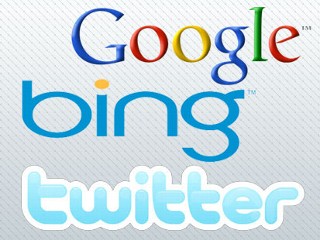Google, Microsoft Bing Deals Benefit Twitter
 12/21/2009 12:40:00 PM
12/21/2009 12:40:00 PM
 kenmouse
, Posted in
Bing
,
Google
,
Microsoft Bing
,
Technology
,
Twitter
,
0 Comments
kenmouse
, Posted in
Bing
,
Google
,
Microsoft Bing
,
Technology
,
Twitter
,
0 Comments
 Recently crowned most influential Twitter user Pete Cashmore believes that Twitter has been saved by its real-time search deals with Google and Microsoft Bing.
Recently crowned most influential Twitter user Pete Cashmore believes that Twitter has been saved by its real-time search deals with Google and Microsoft Bing."It did look a bit hairy for Twitter this year," Mashable founder Cashmore told UK newspaper The Telegraph.
"They've had this flat period over the last few months. Twitter just isn't good at user retention. But the Google deal has come along, and I think that is pretty much their salvation."
"It's given them a revenue stream of what is rumoured to be millions of dollars a month. And it gives them a traffic 'hosepipe' that means every time you search for something that's very 'now' on Google, you're getting results from Twitter. Google's real-time search is essentially Twitter."
"Social media is becoming the web, and social media is becoming the media. There's very little on the web that hasn't had this social element built in to it. It's integrated in to every site you use now."
Twitter Real-Time Search
Cashmore says services such as Facebook Connect -- allowing web users to take their Facebook identity with them when they sign up to new sites -- has made the whole process "incredibly simple" for those companies trying to build social features in to their web presence.
Previously companies had to scramble to build their own platforms to leverage web users' appetite for user-generated content, social interaction and sharing, reports The Telegraph: "You were just left with lots of sites that asked you to join their new social network, meaning people had to keep creating new profiles, creating new networks. It wasn't ideal," said Cashmore.
In his Telegraph interview Cashmore says the halo effect of Twitter's success has been felt across the blogosphere: "It's changed the attitude of the readership on blogs. Before Twitter, blogs had a bit of an engagement issue; people didn't really get comments, readers were consuming things in a more passive way, reading an article and then clicking off to another site.
"One thing that Twitter -- and Facebook too, to a degree - have managed is to increase engagement. That's made blogs like ours much more 'sticky' -- there's more activity going on, more comments, and people are becoming used to having feedback."
But Cashmore sounded a warning bell around social media and privacy concerns: "It's going to be a mess next year. As a society, we're really pushing towards the inevitable of making more and more information available on the web."
"You can't put that information back in the bottle once it's out there. The internet just prefers information to be free.
"Some good things will come out of that, some benefits from people being 'searchable'. It will bring opportunities for connecting and networking and finding other people like you. But you're going to lose a certain amount of control [over personal information] along the way."
The 24-year-old founder of social media blog Mashable forecasts a growing demand for location-based services and "real-time everything" next year.
"Location is definitely going to be the next wave. Especially now there's GPS and the full web on so many phones."
Cashmore rates cult location-based social media site FourSquare as one to watch out for: "I think it will be big next year, especially after South by Southwest. It should see a huge pickup at the gathering of the geeks."




0 Response to "Google, Microsoft Bing Deals Benefit Twitter"
Post a Comment
Leave Your Thoughts & We Will Discuss Together